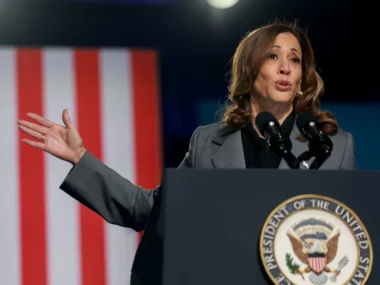President Donald Trump has mandated a 25% import tax on all steel and aluminum entering the US, significantly expanding existing trade restrictions.
Despite warnings of retaliation from Canada—America’s largest supplier of these metals—along with other nations, Trump insisted the tariffs would boost domestic production. US businesses reliant on imports have voiced concerns, but he maintained there would be no exemptions, stating that the policy “simplifies” trade rules and takes effect on March 4.
“This is a major step toward making America wealthy again,” Trump declared. “Our country must produce its own steel and aluminum, not depend on foreign suppliers.”
When asked if consumers would face higher costs, he responded, “Ultimately, it will be cheaper.” He also hinted at future tariffs on pharmaceuticals and computer chips, emphasizing his broader economic strategy.
The US, the world’s largest steel importer, sources most of its steel from Canada, Brazil, and Mexico. Last year, over half of US aluminum imports came from Canada, making it the most affected by the new tariffs.
Canada’s Minister of Innovation, Francois-Phillippe Champagne, condemned the move as “totally unjustified,” arguing that Canadian steel and aluminum play a crucial role in US industries such as defense, shipbuilding, energy, and automotive manufacturing.
Ontario Premier Doug Ford criticized Trump for creating “constant chaos” and jeopardizing economic stability. Canadian steel manufacturers urged immediate retaliation, while Liberal MP Kody Blois stated that Canada was exploring ways to reduce trade dependence on the US.
Meanwhile, US steelmakers saw stock prices surge on Monday in anticipation of the tariffs, with Cleveland-Cliffs shares rising nearly 20%. Steel and aluminum prices also increased.
However, broader market reactions remained cautious, reflecting uncertainty over Trump’s commitment to enforcing the tariffs, given his history of postponing or negotiating exemptions.
During his first term in 2018, Trump introduced similar tariffs—25% on steel and 15% on aluminum—but later granted exemptions to several countries, including Australia, Canada, and Mexico.
‘Replay of 2018’
“This feels like a repeat of 2018,” said Douglas Irwin, an economics professor at Dartmouth College.
“The key question is whether this is a bargaining strategy or if Trump genuinely wants to avoid negotiations and prioritize the steel industry.”
Last week, Trump imposed a 25% import tax on all Canadian and Mexican goods but postponed it for 30 days. He also introduced a 10% tariff on all Chinese imports, triggering retaliation from Beijing.
A tariff is a domestic tax applied to imported goods based on their value.
The prospect of increased US import taxes has raised global concerns, as they would make selling products in the American market more expensive.
Tariffs are central to Trump’s economic policy, aimed at stimulating the US economy, safeguarding jobs, and boosting tax revenue. However, domestic industries relying on steel and aluminum now face higher costs, affecting sectors from construction to can manufacturing.
During Trump’s first term, tariffs led to a 2.4% rise in US steel prices and a 1.6% increase in aluminum costs, according to the US International Trade Commission.
Stephen Moore, a 2016 Trump campaign economic adviser and senior fellow at the Heritage Foundation, expressed skepticism about tariffs as a job-creation tool, citing past outcomes.
While acknowledging Trump’s serious approach to trade, he suggested the move was intended to capture global attention.
“Nearly everything Trump does in Washington is a negotiation tactic,” Moore said.
US officials claim the new measures target countries like China and Russia, which allegedly bypass tariffs by rerouting low-cost products through third parties.
Trump also announced new manufacturing standards requiring steel to be “melted and poured” and aluminum to be “smelted and cast” in North America.
Nick Iacovella, spokesperson for the Coalition for a Prosperous America, which supports the tariffs, expressed concern over rising Mexican steel imports exceeding 2019 agreements.
However, he noted that Canada exports significantly more goods to the US than it imports—a trade imbalance Trump has long criticized.
“There are still issues in US-Canada trade that need to be addressed,” Iacovella said.
He added, “While this isn’t a one-size-fits-all approach, early signs suggest Trump believes both Canada and Mexico are taking advantage of the US, and he intends to act.”











